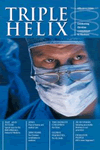The trouble with ethics is that it has acquired a spurious shell of academic protection and an associated scholastic mystique. It is a subject supported by specialist journals, statutory committees, and an obligatory slot in the medical curriculum. We now have professional ethicists to advise us and teach our students. At one level this is right: we need every help we can in making decisions which affect the quality and even the existence of life for other people. But at another level, we are at risk of becoming mere body technicians, concerned with fabric maintenance or repair and passing on as many bucks as we can to other professionals.
In 1994 his Oxford Reader on Ethics, Peter Singer defines ethics as being 'about how we ought to live: what makes an action the right, rather than wrong, thing to do?' This immediately places ethics at the centre of all professional practice - indeed, of all life. When we shunt ethics into a speciality of its own, we are in danger of dehumanising medicine, of down-grading our role as healers and careers and making our 'ethical' decision-making a formalised procedure comparable to dealing with a biochemistry report. As doctors we divorce our ethics from who we are at our peril; we may be able to take appropriate decisions in terms of pathology and prognosis, but it endangers our role as the kind of doctors who treat patients as real people.
There are many good books on medical ethics in general, and on specific problems such as at the beginning and end of life, the difficulties of allocating resources, balancing the interests of the patient with those of his or her family and so on. Far be it from me to denigrate any of these books, but it was very good to welcome a book which firmly placed ethics (including most of the common problems which face doctors) in an explicit Christian rationale, so that, decision-making can develop within a coherent context.
The New Dictionary of Christian Ethics and Pastoral Theology has earned an important place on the shelves of Christian doctors over the last few years - and not only of Christian doctors - since the issues raised in the Dictionary and their possible solutions are common to everyone, regardless of their beliefs. Put another way, the contents of the book are especially relevant to all those who acknowledge that we are more than mere naked apes. It is particularly helpful in extending its coverage to society, to relationships as well as those matters concerning the individual.
There is a vast amount of material in the 900 plus pages of this Dictionary. I was delighted when I first received a copy; I am no less delighted five years and many usages later.
Reviewed by:
Sam Berry
Professor of Genetics, University College London, a former member of the Human Fertilisation and Embryology Authority (1990-6); former President of Christians in Science, of the Linnean Society, and of the British Ecological Society































